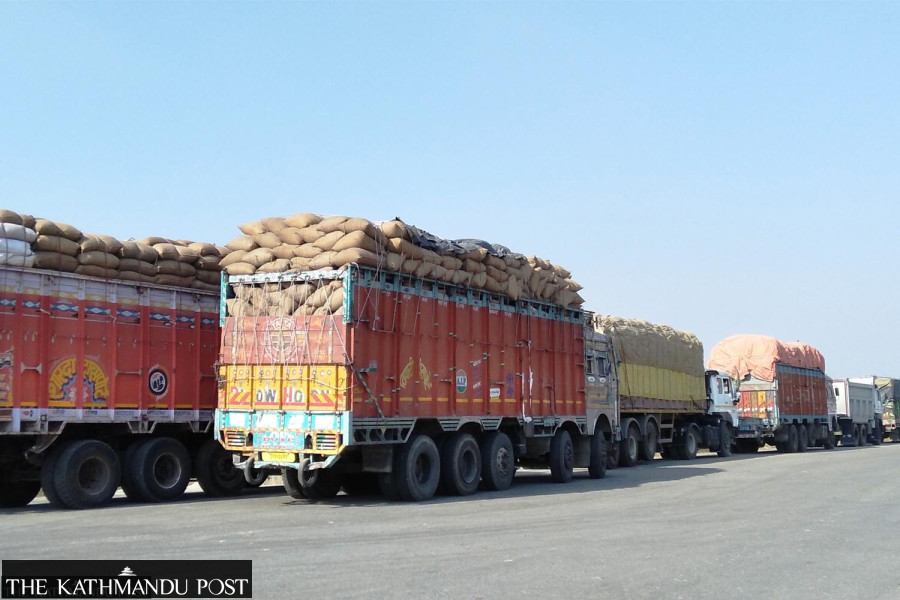Money
After iron producers, food importers decry tax policy
The advance income tax on food and pulses has increased the price of a 25kg rice bag by Rs100 and pulses by Rs20 per kg.
Post Report
Industrialists on Wednesday said that the provision of advance income tax on food and pulses imposed by the government through the budget would increase prices by at least 30 percent, warning that the country’s inflation may balloon if immediate measures are not taken.
Nepal Rice Oil Dal Industry Association, Nepal Flour Industry Association, and Livestock Feed Industry Association held a joint press meeting to criticise the government's move, which they say would not only increase the prices but may also put the food industry on the edge of bankruptcy.
This is because the rise in prices in the domestic market will fuel smuggling from bordering towns in India where these products are cheaper, said Kumud Kumar Dugad, president of the Nepal Rice Oil and Dal Industry Association.
Through the Financial Bill, the government has provisioned collecting 2.5 percent advance income tax on rice imports and 10 percent on pulse imports.
“This is totally irrational. This shows that the government is not serious towards the consumers and sensitive industries like the food industry,” said Dugar.
He questioned the rationale behind the advance tax imposed on food imports and the principle of taxation.
He said that the price of a bag of rice (25 kg) has increased by Rs100 since the introduction of the advance tax, and the price of pulses has increased by Rs20 per kg.
A study titled ‘Dynamics of informal cross-border trade in agricultural products between Nepal and India’, undertaken by the South Asia Watch on Trade, Economics and Environment (SAWTEE) in partnership with the International Food Policy Research Institute, lists rice as a key commodity ‘highly informally’ imported from India to Nepal.
The paper said that only 40 percent of rice is imported to Nepal from India through the formal channel.
The research shows that informal trade has thrived after the imposition of a 9 percent agriculture reform fee and a 2.5 percent advanced income tax, leading to a total duty of 11.5 percent on rice imports.
India, on the other hand, often bans the export of rice and other food commodities.
With this variation, prices in Nepal and India differ by 18-20 percent, or rice in India becomes cheaper by at least 18 percent.
The paper said that India's ban on rice and other agricultural exports has led to massive smuggling of food through the 1,800 km porous border between Nepal and India.
Hemraj Dhakal, vice president of the Federation of Nepalese Chambers of Commerce and Industry, said that the government should withdraw such tax.
“The taxation policy has harmed the domestic industry.”
Various representatives from the Birgunj Chamber of Commerce and Industry, Siddharthnagar Chamber of Commerce and Industry, Nepal Chamber of Commerce, and the Confederation of Nepalese Industries have also demanded that the advance tax on food items be rolled back.
Subodh Kumar Gupta, former president of the Association of Nepalese Rice, Oil and Pulses Industries, said that the government is losing revenue as illegal imports have thrived. “The new tax policy will not only make food items expensive, it will kill the domestic industry as well," he said.
The private sector has also criticised the government's move to increase customs duty on sponge iron.
The import duty on sponge iron has been raised from 1 percent to 2.5 percent. Both scrap and pig iron, which previously had zero import duty, are subjected to a 1 percent import duty.
Nepal Iron Rod Producers’ Association also held a press conference in Kathmandu on Wednesday saying that the government’s new tax policy has put the Rs36 billion industry in jeopardy. The association expressed concerns that the government's decision will negatively impact industrialisation in the country in the long run.
Meanwhile, Finance Minister Barsha Man Pun on Wednesday told Parliament that the domestic market would be protected by the advance income tax on imports of food commodities.
He told lawmakers that the 10 percent advance income tax was levied for import substitution.
"This naturally will make imported goods more expensive. Our agricultural markets will be protected," he said, adding that he had taken a “correct” move.
Pun said that VAT has been removed from potatoes, onions and fruits.




 16.12°C Kathmandu
16.12°C Kathmandu












